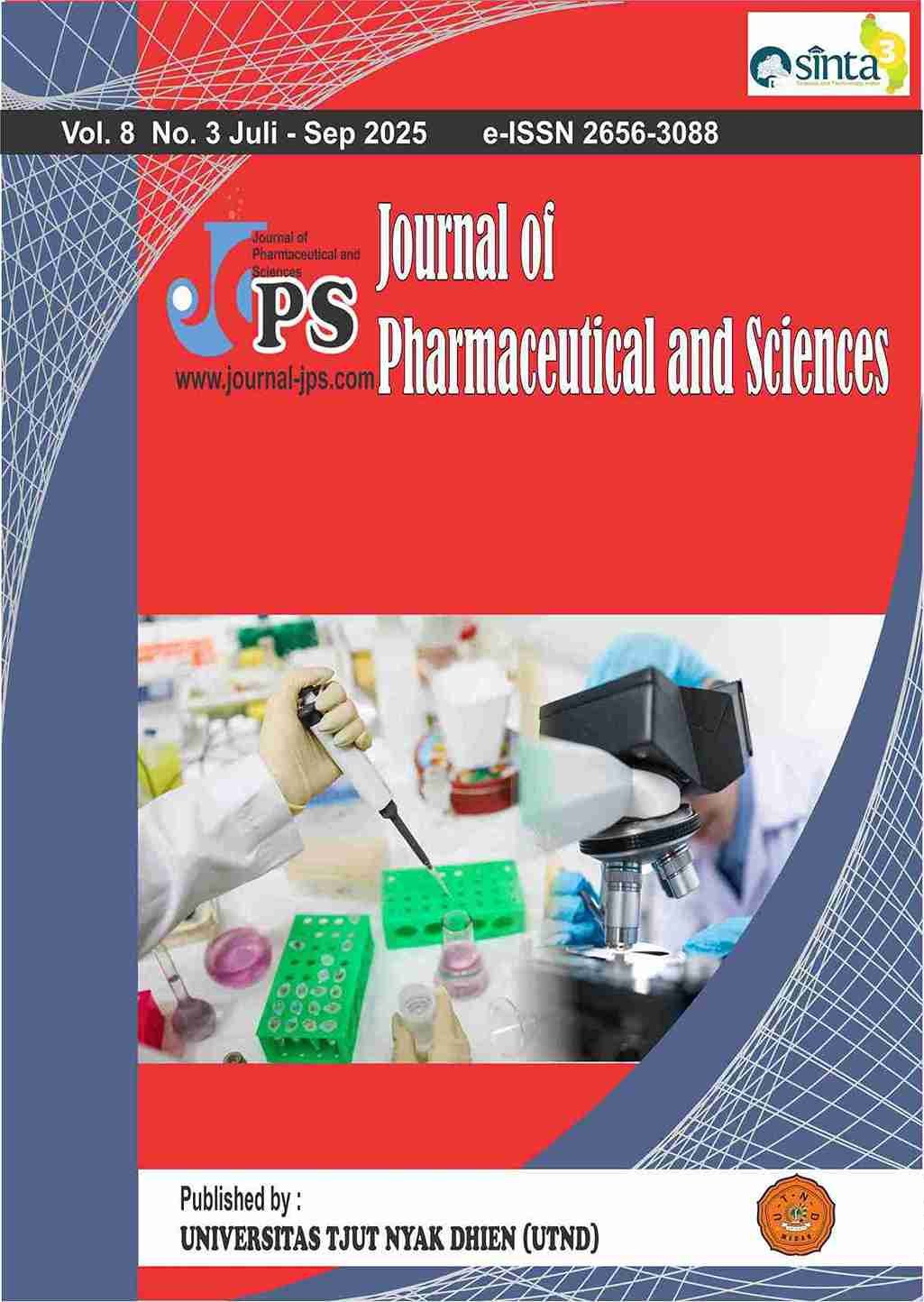Folic Acid Supplementation in First-Trimester Pregnant Women for Preeclampsia Prevention: A Retrospective Cohort Study
Main Article Content
Page: 1479-1485
Abstract
Preeclampsia is a disorder characterized by hypertension and proteinuria that manifests during gestation. Various vitamins can influence food consumption during pregnancy. Folic acid supplementation is known to reduce preeclampsia risk, yet adherence remains low among pregnant women. The objective of the research is to identify risk variables and dosage efficacy associated with folic acid utilization. This study employs an retrospective cohort study and utilizes retrospective data collection. Data was gathered from Cahaya Ibu Pharmacy Store in Makassar, encompassing a total of 164 patients. A chi-square statistical study indicated a substantial risk association between pregnant women and the onset of hypertension in comparison to nonpregnant individuals, with a p-value of 0.001. Pregnant women had twice the risk, as shown by an odds ratio of 1.9. The study of Fisher's test data indicates a correlation between patient age and hypertension condition. The findings indicate no substantial correlation between the two variables, with a p-value of 0.523. The findings indicate a substantial correlation between the mitigation of raised blood pressure risk and the consumption of folic acid. The early use of folic acid during pregnancy planning significantly diminishes the likelihood of preeclampsia. Risk factors for preeclampsia include insufficient folic acid consumption, the duration of folic acid supplementation, and the pregnancy status of individuals with a disease risk of up to 98%. Less at age 30 years old, the consumption of folic acid may reduce the risk.
Downloads
Article Details

This work is licensed under a Creative Commons Attribution-NonCommercial-ShareAlike 4.0 International License.
References
Wen SW, Champagne J, Rennicks White R, et al. Effect of folic acid supplementation in pregnancy on preeclampsia: the folic acid clinical trial study. J Pregnancy. 2013;2013:294312. doi:10.1155/2013/294312 DOI: https://doi.org/10.1155/2013/294312
Wang Y, Zhao N, Qiu J, et al. Folic acid supplementation and dietary folate intake, and risk of preeclampsia. Eur J Clin Nutr. 2015;69(10):1145-1150. doi:10.1038/ejcn.2014.295 DOI: https://doi.org/10.1038/ejcn.2014.295
Saragih ID, Dimog EF, Saragih IS, Lin C-J. Adherence to Iron and Folic Acid Supplementation (IFAS) intake among pregnant women: A systematic review meta-analysis. Midwifery. 2022;104:103185. doi:10.1016/j.midw.2021.103185 DOI: https://doi.org/10.1016/j.midw.2021.103185
Bastos Maia S, Rolland Souza AS, Costa Caminha M de F, et al. Vitamin A and Pregnancy: A Narrative Review. Nutrients. 2019;11(3). doi:10.3390/nu11030681 DOI: https://doi.org/10.3390/nu11030681
Murphy MSQ, Muldoon KA, Sheyholislami H, et al. Impact of high-dose folic acid supplementation in pregnancy on biomarkers of folate status and 1-carbon metabolism: An ancillary study of the Folic Acid Clinical Trial (FACT). Am J Clin Nutr. 2021;113(5):1361-1371. doi:10.1093/ajcn/nqaa407 DOI: https://doi.org/10.1093/ajcn/nqaa407
Corsi DJ, Gaudet LM, El-Chaar D, et al. Effect of high-dose folic acid supplementation on the prevention of preeclampsia in twin pregnancy. J Matern neonatal Med Off J Eur Assoc Perinat Med Fed Asia Ocean Perinat Soc Int Soc Perinat Obstet. 2022;35(3):503-508. doi:10.1080/14767058.2020.1725882 DOI: https://doi.org/10.1080/14767058.2020.1725882
Mardali F, Fatahi S, Alinaghizadeh M, et al. Association between abnormal maternal serum levels of vitamin B12 and preeclampsia: a systematic review and meta-analysis. Nutr Rev. 2021;79(5):518-528. doi:10.1093/nutrit/nuaa096 DOI: https://doi.org/10.1093/nutrit/nuaa096
Zec M, Roje D, Matovinović M, et al. Vitamin B12 Supplementation in Addition to Folic Acid and Iron Improves Hematological and Biochemical Markers in Pregnancy: A Randomized Controlled Trial. J Med Food. 2020;23(10):1054-1059. doi:10.1089/jmf.2019.0233 DOI: https://doi.org/10.1089/jmf.2019.0233
Centeno Tablante E, Pachón H, Guetterman HM, Finkelstein JL. Fortification of wheat and maize flour with folic acid for population health outcomes. Cochrane Database Syst Rev. 2019;2019(7). doi:10.1002/14651858.CD012150.pub2 DOI: https://doi.org/10.1002/14651858.CD012150.pub2
Rana S. Preeclampsia: Pathophysiology, Challenges, and Perspectives. Circ Res. 2019;124(7):1094-1112. doi:10.1161/CIRCRESAHA.118.313276 DOI: https://doi.org/10.1161/CIRCRESAHA.118.313276
Golden TN, Simmons RA. Maternal and neonatal response to COVID-19. Am J Physiol Endocrinol Metab. 2020;319(2):E315-E319. doi:10.1152/ajpendo.00287.2020 DOI: https://doi.org/10.1152/ajpendo.00287.2020
Ogundipe O, Hoyo C, Ostbye T, et al. Factors associated with prenatal folic acid and iron supplementation among 21,889 pregnant women in Northern Tanzania: a cross-sectional hospital-based study. BMC Public Health. 2012;12:481. doi:10.1186/1471-2458-12-481 DOI: https://doi.org/10.1186/1471-2458-12-481
Roberge S. Meta-analysis on the effect of aspirin use for prevention of preeclampsia on placental abruption and antepartum hemorrhage. Am J Obstet Gynecol. 2018;218(5):483-489. doi:10.1016/j.ajog.2017.12.238 DOI: https://doi.org/10.1016/j.ajog.2017.12.238
Kaymaz C, Demir A, Bige O, Cagliyan E, Cimrin D, Demir N. Analysis of perinatal outcome by combination of first trimester maternal plasma homocysteine with uterine artery Doppler velocimetry. Prenat Diagn. 2011;31(13):1246-1250. doi:10.1002/pd.2874 DOI: https://doi.org/10.1002/pd.2874
Kemse N, Kale A, Chavan-Gautam P, Joshi S. Increased intake of vitamin B12, folate, and omega-3 fatty acids to improve cognitive performance in offspring born to rats with induced hypertension during pregnancy. Food Funct. 2018;9(7):3872-3883. doi:10.1039/c8fo00467f DOI: https://doi.org/10.1039/C8FO00467F
Chen S, Li N, Mei Z, et al. Micronutrient supplementation during pregnancy and the risk of pregnancy-induced hypertension: A randomized clinical trial. Clin Nutr. 2019;38(1):146-151. doi:10.1016/j.clnu.2018.01.029 DOI: https://doi.org/10.1016/j.clnu.2018.01.029
Obeid R, Schön C, Wilhelm M, Pietrzik K, Pilz S. The effectiveness of daily supplementation with 400 or 800 µg/day folate in reaching protective red blood folate concentrations in non-pregnant women: a randomized trial. Eur J Nutr. 2018;57(5):1771-1780. doi:10.1007/s00394-017-1461-8 DOI: https://doi.org/10.1007/s00394-017-1461-8
Yusuf KK, Salihu HM, Wilson R, et al. Comparing Folic Acid Dosage Strengths to Prevent Reduction in Fetal Size Among Pregnant Women Who Smoked Cigarettes: A Randomized Clinical Trial. JAMA Pediatr. 2019;173(5):493-494. doi:10.1001/jamapediatrics.2019.0112 DOI: https://doi.org/10.1001/jamapediatrics.2019.0112
Yunxia Wang, Bihong Cui, Jiuju Zhou, Shuang Yue, Chun Wang, Yongzhong Gu, Jinlai Meng. Risk Factors Associated with Low Apgar Scores in Pregnancies Complicated by Severe Preeclampsia: A Case–Control Study. Clin. Exp. Obstet. Gynecol. 2024, 51(12), 264. doi.org/10.31083/j.ceog5112264 DOI: https://doi.org/10.31083/j.ceog5112264
Maulana Kamri A, Kosman R, Putra B. Evaluating the Cost-Effectiveness of Folic Acid Versus Methyltetrahydrofolate in Preventing Preeclampsia in Makassar, Indonesia. Cureus. 2024;16(3):1–6. doi: 10.7759/cureus.56671. DOI: https://doi.org/10.7759/cureus.56671





